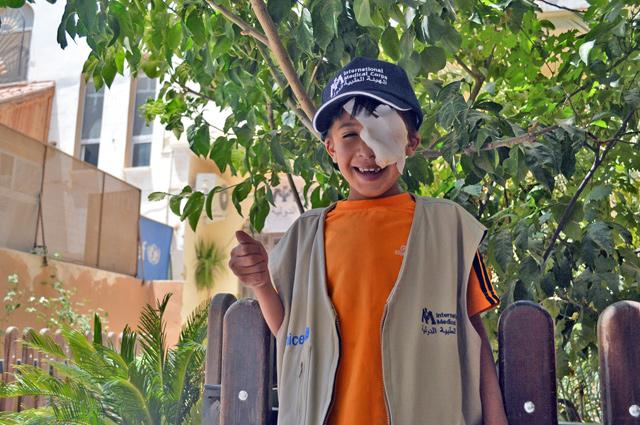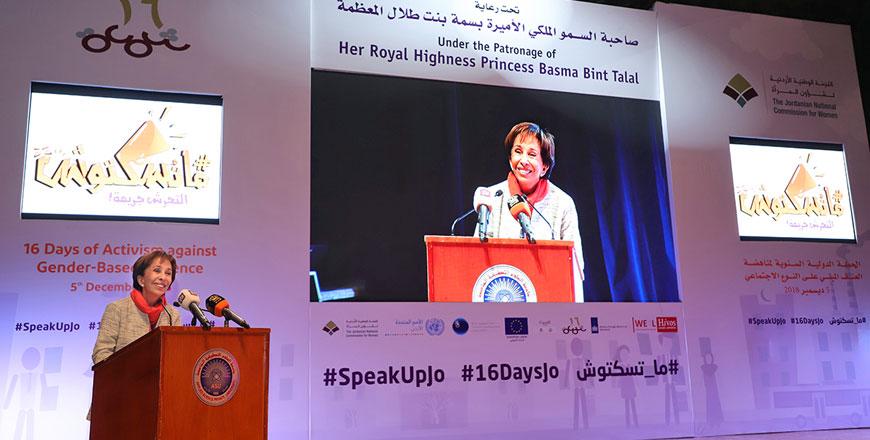You are here
National response plan to Syria crisis calls for int’l community’s support — study
By Rana Husseini - Sep 24,2019 - Last updated at Sep 24,2019

Nine-year-old Khalid, a Syrian refugee, is seen during the International Medical Corps’ Adolescent Friendly Space programme in Mafraq, according to the Jordan Response Platform for the Syria Crisis (Photo courtesy of IMC)
AMMAN — A local study has called on the international community to continue to shoulder its legal and moral responsibilities in supporting Jordan to meet its hosting obligations pursuant to the international principle of cooperation and burden-sharing among states.
The Jordanian government has developed the Jordan Response Platform for the Syria Crisis, which aims to alleviate the situation of the Syrian refugees and enhance the flexibility and effectiveness of the legal, health, psychological, social and medical service delivery system for refugee women and children at risk of dropping out of school.
The report stated that 51 per cent of the refugees covered by the survey are under 18 years of age, 28 per cent of them completed secondary education, 20 per cent completed primary education, 11 per cent are illiterate, 4 per cent hold a bachelor’s degree and 2 per cent hold a diploma.
These figures, the report maintained, place great demands on educational capacity. With the increasing overcrowding of public schools, the education sector in Jordan suffers from a lack of classrooms, overcrowded classrooms and double shifting. Public spending on its sectors has increased dramatically and unexpectedly because of the increase in the number of beneficiaries of those services, which constitutes a major budgetary burden and creates a continuing deficit.
The response plan needs the continuous support of the international community, according to the report that was prepared by the Jordanian National Commission for Women (JNCW) and titled "Comprehensive National Review of the Progress in the Implementation of the Beijing Declaration and Platform for Action 25 Years On".
The successive plans have included development projects that respond to critical areas of the Beijing Platform for Action in the sectors of education, labour, energy, the environment, health, justice, housing, water, transportation, social protection and decent livelihood, in addition to the requirements of treasury support to cover the increase in security costs and government support for various commodities and materials, as well as losses resulting from the repercussions of the Syrian crisis, according to the JNCW report.
The report aimed to highlight the progress towards Jordan’s commitments in the area of gender equality and the empowerment of women and girls, as well as to identify challenges, obstacles and priorities and renew commitments, taking into account regional and national data, according to the JNCW.
The preparation of the report helped provide the latest data on indicators related to gender equality and women’s empowerment in regards to the goals and targets of the Sustainable Development Agenda 2030, and the available information and data, their sources and gaps in the provision of data, according to the JNCW.
The JNCW study pointed out that national efforts to promote women and achieve gender equality have encountered considerable resistance at the institutional, cultural, community and individual levels.
"Cultural and social structures continue to play a major role in framing policies, programmes and initiatives and determining their ability to achieve qualitative change in power relations, social roles and stereotypes that govern the effectiveness and success of such policies and programmes," the JNCW study read.
Turning to the economic aspect, the report revealed that the overall female unemployment rates were still high, reaching 26.8 per cent in 2018.
The pay gap is widening in favour of males, the report added, basing the figures on the annual report from the Department of Statistics for 2017, which indicated that the average monthly wage is JD507 for male employees and JD458 dinars for working women, with a difference of JD49.
Furthermore, the report stated that in some economic sectors, the employment of women is largely unorganised, especially in the sectors of agriculture, secretariat, private schools, shops and domestic labour.
As a result, the report maintained, women are exposed to many violations and abuses in disregard of decent work conditions, legal protection, social security and international labour standards, among others.
Regarding technology use, the JNCW said that 76.5 per cent of females and 86.7 per cent of males use the Internet.
"This means that the digital gender gap related to Internet access is quite narrow," the study revealed.
However, the study maintained, there are still barriers to women’s access to the Internet and the provision of telecommunications services to disadvantaged segments of society, or those who are socially or economically disadvantaged, at affordable cost. Older women in remote areas, with low or no income, are hardly able to use the Internet, especially because of increased taxes on the use of communication means in the past years. These obstacles hinder women’s opportunities to enjoy the scientific and social benefits of using the Internet, according to the JNCW study.
The report was prepared by the JNCW under the guidance of the Ministerial Committee on Empowerment of Women in collaboration with UN Women and the Economic and Social Commission for Western Asia.
The report is part of national participatory efforts from various government institutions, the military and security sectors, relevant civil society organisations, in addition to both Houses of the National Assembly, the Senate and the House of Representatives, trade unions and parties, the JNCW said.
Related Articles
AMMAN — The Jordanian National Commission for Women (JNCW) on Wednesday launched the 2017 edition of the 16 Days of Activism against Gender-
AMMAN — HRH Princess Basma on Wednesday said that it was everyone’s moral responsibility to help eradicate sexual harassment from society.&n
AMMAN — Women leaders have praised a recent decision by the Inter-Ministerial Committee for Women’s Empowerment (IMCWE) to adopt the N

















